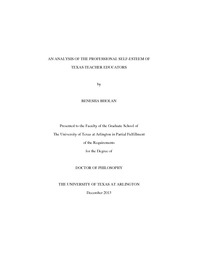
ATTENTION: The works hosted here are being migrated to a new repository that will consolidate resources, improve discoverability, and better show UTA's research impact on the global community. We will update authors as the migration progresses. Please see MavMatrix for more information.
Show simple item record
| dc.contributor.author | Bholan, Benesha | en_US |
| dc.date.accessioned | 2014-03-12T23:51:55Z | |
| dc.date.available | 2014-03-12T23:51:55Z | |
| dc.date.issued | 2014-03-12 | |
| dc.date.submitted | January 2013 | en_US |
| dc.identifier.other | DISS-12430 | en_US |
| dc.identifier.uri | http://hdl.handle.net/10106/24143 | |
| dc.description.abstract | Increased pressures from a multitude of sources have directly impacted all educational institutions. A predicted shortage of qualified teachers over the next decade means it is crucial that new teachers remain in the profession and are well prepared to deal with the challenges that await them. Although teacher educators play a vital role in preparing future teachers to enter and remain in our schools, research over time has shown that they have been historically held in low esteem by faculty at colleges and universities. Self-esteem can impact job performance as well as one's own feeling of self-worth. The purpose of this study was to gain insights into the professional image teacher educators in Texas have of themselves as well as the professional esteem they perceive from their academic colleagues in other departments. This study also investigated whether or not levels of esteem may be impacted by the size, type, and accreditation of an institution and if these beliefs are consistent over time. This study used a survey initially developed by Richard Reynolds in 1992 and fine-tuned by Ron Tinsley in 2002. The survey was distributed electronically to teacher educators throughout Texas in order to attain data that was analyzed using SPSS software. The study calculated factor sums in order to test three hypotheses using paired-sample t tests, a one-way ANOVA, and independent sample t tests. Paired-sample t tests were used to determine if significant differences existed between levels of professional self-esteem of teacher educators and their perceived professional esteem from colleagues in other departments. A one-way ANOVA was used to determine if the classification of an educational institution impacts levels of professional self-esteem. Independent sample t tests established if accreditation or non-accreditation impacts professional self-esteem. The research from this study discovered there are significant differences between how teacher educators in Texas regard themselves professionally and how they feel they are perceived professionally by their academic colleagues in other departments. The study found that the classification of an institution has minimal impact on professional self-esteem between Texas teacher educators. The results of the study also suggest that NCATE accreditation may have a negative impact on those surveyed. Results from this study show similarities and differences exist over time regarding both the perceptions teacher educators have of themselves and the perceptions they have regarding how they are viewed by their academic colleagues. | en_US |
| dc.description.sponsorship | Hardy, James C. | en_US |
| dc.language.iso | en | en_US |
| dc.publisher | Education | en_US |
| dc.title | An Analysis Of The Professional Self-esteem Of Texas Teacher Educators | en_US |
| dc.type | Ph.D. | en_US |
| dc.contributor.committeeChair | Hardy, James C. | en_US |
| dc.degree.department | Education | en_US |
| dc.degree.discipline | Education | en_US |
| dc.degree.grantor | University of Texas at Arlington | en_US |
| dc.degree.level | doctoral | en_US |
| dc.degree.name | Ph.D. | en_US |
Files in this item
- Name:
- Bholan_uta_2502D_12430.pdf
- Size:
- 2.363Mb
- Format:
- PDF
This item appears in the following Collection(s)
Show simple item record


